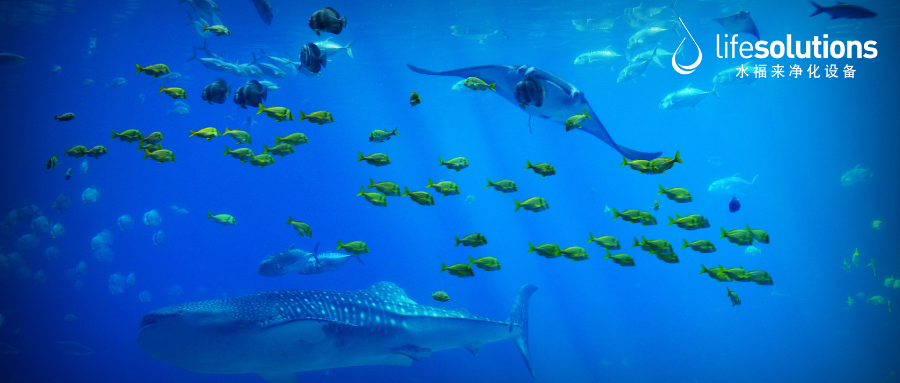This year’s World Oceans Day and National Oceans Awareness Day focus on “Protecting the Marine Ecosystem and Harmonious Coexistence between People and Nature.” The aim is to raise global awareness about the oceans’ vital role in climate regulation and promote effective measures for marine environment protection and the preservation of a healthy ecosystem. These events emphasize the importance of understanding and safeguarding the oceans, urging individuals worldwide to take action for their conservation and sustainability.
The ocean sustains life, offers valuable resources, and unites us in a shared destiny. As inhabitants of this blue planet, let us join forces to combat marine pollution and protect our precious blue realm. Together, we can safeguard its future.

1.Marine Pollution Hazards: assessing the current situation
Marine ecosystems suffer from destructive impacts caused by the introduction of harmful substances, resulting in pollution that damages biological resources and poses threats to human health. Fishing and other activities at sea also hinder seawater and environmental quality.1 The persistent, widespread, and challenging-to-control nature of marine pollution stems from its multiple sources.2 Over the past decades, rapid global industrialization has intensified marine pollution, leading to significant ecological changes in local areas and a concerning trend of continual expansion.

China, a maritime powerhouse, boasts 18,000 km of coastline, numerous seaport cities, and a third of its land mass dedicated to marine territory.3 Despite its global prominence in marine life diversity, marine renewable energy, and oil resources, China faces escalating marine pollution due to rapid urbanization and population growth. The decline of fisheries and the surge of natural disasters have spurred contemplation on effective management strategies for the marine environment.
2. Origins of Marine pollutants

1.Oil pollution
Oil pollution poses severe threats to marine life, as oil films or condensations can adhere to fish eggs or larvae, causing their death or deformities. Additionally, fish and shrimp may emit a pungent odor as a result of exposure to oil contamination.4
2.Metals and acids/bases
Metals such as chromium, manganese, iron, copper, zinc, silver, cadmium, antimony, mercury, lead, phosphorus, arsenic, etc., and acids/bases have detrimental effects on marine life, causing toxicity, reduced growth, reproductive issues, and even death. These pollutants disrupt the delicate balance of marine ecosystems and pose a significant threat to the well-being of marine organisms.5
3.Pesticides, organic waste, and domestic sewage
Pesticides, organic waste liquids, and domestic sewage enter the ocean primarily through runoff, exerting strong toxic effects on marine organisms. In severe cases, organic and domestic wastewater can trigger harmful red tide occurrences.6 In China’s near-shore waters, over 300 red tide incidents have been recorded since 1980, with one lasting 72 days in 1989, resulting in economic losses nearing 100 million yuan.
4.Plastic waste and plastic pollutants
Plastic waste and pollutants have devastating effects on marine life, causing the deaths of around 100 million organisms annually. Nearly a thousand species are impacted by marine pollution. Microplastic particles, known as PM2.5 present a grave threat to coral reef ecosystems. 7

3.Safeguarding the Ocean and Exploring Solutions
1.Mitigating the Carbon Footprint
Human-induced climate change significantly impacts the marine environment. By reducing your carbon footprint, you can control ocean acidification and minimize harm to coral reefs and marine life. Adopt eco-friendly travel practices, utilize energy-efficient lighting, limit elevator usage, employ fans instead of excessive air conditioning, and embrace clean energy solutions. Implementing these actions at home or in the workplace empowers individuals to make independent contributions to ocean conservation.

2.Preserving the Beach Environment
After your beach visit, kindly ensure to remove and recycle your trash responsibly. Consider lending your family or friends a hand in collecting litter left behind by others. Active participation as responsible citizens in global beach cleanup initiatives and ocean litter-free campaigns is crucial.
3.Minimizing Plastic Waste: A Call for Sustainable Practices
Decrease reliance on plastic by opting for reusable cups, bowls, and shopping bags while minimizing the use of disposable plastic items like bags and straws. Stay informed about plastic recycling programs and make an effort to reduce the consumption and disposal of single-use plastic products. By doing so, we can significantly reduce the amount of plastic waste entering our oceans.

4.Life Solutions is taking action to safeguard the marine ecosystem
The ocean, a shared heritage, demands global responsibility for raising awareness and safeguarding its environment on World Ocean Day. Lifesolutions, a water purifier provider, committed to providing cleaner water, fulfills its social duty by actively engaging in environmental protection initiatives.

Life Solutions: Leading the Way in Sustainable Water Purification
Our water purification equipment not only conserves energy but also minimizes plastic bottle consumption, making a positive impact on the planet. We take pride in protecting rivers, wetlands, and their inhabitants.

Additionally, we promote resource conservation through initiatives like “Vegetarian Monday,” educational seminars advocating for Earth’s protection, and implementing paper recycling programs to minimize waste.
World Oceans Day
Join us in
Protect the marine environment
Protect the blue planet
References
[1] Meng Fan. Protecting blue ecology and building green Guangdong–Problems and countermeasures of Guangdong’s offshore ecology [C]// The 12th National Symposium on Agroecology. China Ecological Society; Guangdong Ecological Society, 2005.
[2] Ji, Haibo. Marine pollution and environmental protection [M]. Hebei Science and Technology Press, 2013.
[3] Roy Qi. China’s coastline [J]. Urban Party Newspaper Research, 2019(8):3.
[4] Yang Lianghua. China’s implementation of the Oil Spill Contingency Plan for offshore oil exploration and development[J]. Marine Science and Technology Update, 1996(6):2.
[5] Sokolova A V I I M . Effects of metal pollution and ocean acidification on the physiology of marine organisms[J]. Journal of Zoology: English version, 2015(4):16.
[6]Yu Shen X. Kinetic analysis of the evolution of red tide algal density[D]. Tianjin University of Technology, 2016.
[7] Lu Ya-Mei, Zhang Wan-Kyun, Liu Na, et al. Current status of research on the impact of microplastics on the marine environment[J]. Liaoning Chemical Industry, 2022, 51(12):4.



